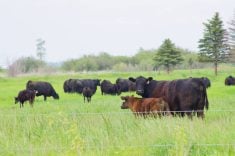So little time and so much to do describes the Hay West campaign for
the McWilliams family.
As the campaign winds down, organizer Willard McWilliams and sons Wyatt
and Wayne, hopped on a westbound jet to assess the Alberta drought for
themselves.
Their western trip included accepting a $312,000 cheque from the
Canadian Association of Petroleum Producers in Calgary for
transportation costs to continue moving donated hay from Eastern Canada
to Alberta and Saskatchewan.
Read Also

House ag committee to undertake several studies
The House of Commons standing agriculture committee has set its agenda for the coming months. Members began the fall sitting with a two-hour update on international trade
The McWilliams were moved to help western farmers when they heard
reports of the western drought, livestock selloffs, fried crops and
emotionally bruised families living through the drought.
Now living in the Ottawa Valley, Willard travelled west on harvest
crews as a young man. He never forgot the hospitality he received in
Alberta. After westerners helped his region during the ice storms, he
decided it was payback time.
“Dad knew this had to be done promptly. He knew there was an urgency,”
said his son, Wayne.
Starting with four people and 10 rail cars, word soon spread until a
single gesture of generosity reached across the country. Donations of
money and hay have poured in from across Canada.
“Nobody realized it would get so big,” said Wyatt. “There was far more
generosity than we could handle.”
Collecting the feed, organizing fumigation through the Canadian Food
Inspection Agency, loading rail cars and distributing hay could have
become a Herculean task for one family.
“We never asked for a bale of hay, but the phone started to ring,” said
Willard.
Strangers called and appeared at their doorstep offering to handle the
logistics of collection and distribution, answer phone calls and raise
funds.
The federal and Alberta governments provided money and Ottawa provided
toll-free phone numbers and an office. A board of directors was set up
to oversee the operations.
As of Oct. 11, 525 farmers in Alberta and about 300 Saskatchewan
producers won 35-40 large bales each in the lotteries. Hay West loaded
736 rail cars and 150 trucks.
In addition to hay, the campaign has collected high quality greenfeed
to be offered in a lottery to dairy producers. Some hay has also
arrived at the 4-H Centre at Westerose, Alta., from the Delta region in
British Columbia.
Weather is limiting deliveries. The hay can’t be fumigated for cereal
beetles once the temperature falls below 5 C, and as fall rains set in,
the hay does not properly cure for its journey west.
As the McWilliams travel through Alberta, they want to learn if money
donations would be more useful to enable farmers to buy locally
produced feed.
A wet, cold harvest on the Prairies is downgrading wheat to feed grain,
while others have decided to bale or silage crops rather than combine
them for seed. That feed could be moved around the province more
cheaply than eastern hay.
The family also agrees the need for feed is always going to occur when
drought, floods, blizzards or fires wipe out supplies. The idea of a
permanent bank of feed and resources appeals to them.
“There are fewer and fewer farmers and we don’t want to lose any of
them,” said Wyatt.

















